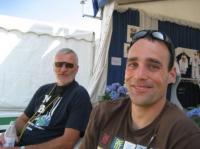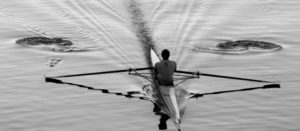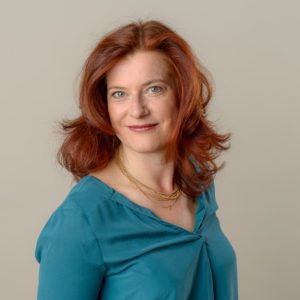

I ask Claes about their history together. We started working together in 1998 at our club, Koninklijke Roeivereniging Brugge (KRB). It isnt a big club with about 80 competitors and and a lot of recreational rowers. I was coaching a lot of young boys together and Tim was one of the best and we started to go into the national team and there were 3 together worlds in Linz in a quad scull and we got 6th.
The year after I spent more time with Tim and we got selected for the Junior Worlds in 1x and won bronze in Plovdiv.
Do you worry about being smaller than other single scullers? I was generally a little smaller than the rest from when I was a junior and its the same now. I made a choice to row as a heavyweight so I dont have to complain about it.
I studied in Ghent and I continue to live there and in the winter I go back to Brugge to train on the canal because that is very good. I stopped rowing after the juniors because I was studying but after a two year break in 2002 I did a double for U23 and we came 6th. We carried on in that combination and in 2003 we missed qualification for the Athens Olympics when we came 13th [the cut-off for pre-qualification was 12th]. This was a disappointment.
In 2004 I changed to the single scull and it just worked. After the first world cup I was 7th and I realised that maybe I could go to the Olynmpics.
What did you mean it just worked? I was just fast I knew I was fast as a junior single but the senior is different I didnt know what to expect but competing with the rest of the field and came 7th I knew if I worked a bit harder I knew I would be a bit closer.The extra work was with my physio comprising back and abdominal strength to improve my positions [posture] and long endurance work as well. The core stability was a problem after 2004 when I got a back injusry. But it really increased my speed.
Claes, what did you learn as a coach from working with the Physio? The physio spent a lot of time with us at camps and races and I know him well. He told me things I should look after and look out for and also in the weight training for correct posture. At that time I wasnt a full time professional coach so in 2006 I became professional.
When did you become a full time athlete, Tim? Since 2004 I went pro I had a contract and I finished my studies during 2005. The full time athletes life in the beginning you have so much free time and so you have to be careful not to go crazy.But the pressure is much higher because you have to earn your money. There are four other professionals in Belgium: the mens 2x and womens 1x Anikke. Tim was the first to get a pro contract and the year later the double and Annik this year.
I think in modern rowing you have to be professional – you can study half time but full time work and high level rowing is impossible.
Claes, what improvments would you like to see in Belgian rowing? The changes the rowing federation should make is to look earlier to the younger rowers. We should want everyone to row in the same way. When the boys come into the national team there are some different styles and four different styles in one boat. If we could start and begin them in the same way it would make our life easier as coaches. Also we need to have the perfect rowing technique from age 14 and after that time the physical condition can be trained later.
I would also like moire support as they move from a good junior to transition to U23 it is difficult because nobody was looking after the group and and it was being done in the free time of the coaches who also had to look after the pro rowers. Now it is more strictly followed. We could look for more professional coaches – the money for that cant come from the clubs – unlike the big ones in Britian, we cant afford it. I am the only pro coach after the head coach.The government should spend money on that.
Tim, Claes do you have any advice for young athletes? Tim: enjoy the rowing, improve your technique and listen to the coach. First enjoy the rowing especially when youare young. Claes: If you enjoy it then you need a lot of training so you dot forget you need to work hard – more than 2-3 times a week. You have to do it when the conditions are bad like rain or windy. It is hard work to get to a high level.







